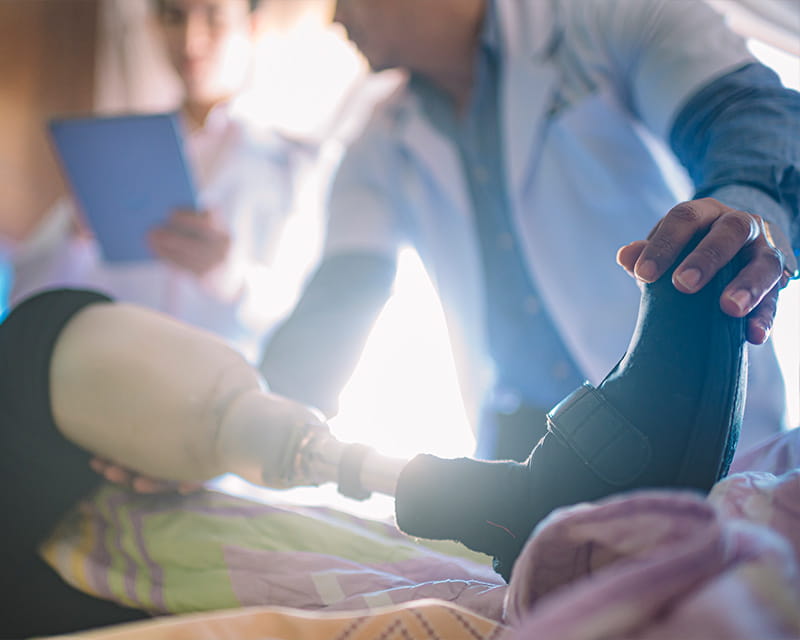
The benefits of using platelet-rich plasma therapy to treat back pain
 For patients who require prosthetic or orthotic devices, obtaining the right function and quality of life can be challenging. That’s why numerous patients in Ohio and the surrounding area come to The Ohio State University Wexner Medical Center to seek a second or third opinion from physiatrist Mark Tornero, MD, and his interdisciplinary team, which includes prosthetists and orthotists from major vendor companies and physical therapists.
For patients who require prosthetic or orthotic devices, obtaining the right function and quality of life can be challenging. That’s why numerous patients in Ohio and the surrounding area come to The Ohio State University Wexner Medical Center to seek a second or third opinion from physiatrist Mark Tornero, MD, and his interdisciplinary team, which includes prosthetists and orthotists from major vendor companies and physical therapists.
Dr. Tornero and his team specialize in using prosthetic and orthotic devices to improve patient function and quality of life. With their expertise, they are able to offer a wide variety of options to patients whose devices aren’t working for their lifestyles.
“Most patients we work with are those who are using a prosthetic or orthotic device and aren’t getting the best function they can have,” Dr. Tornero says. “Our team provides patients with a comprehensive, 360-degree evaluation to assess their needs. We get many consultations to provide a second or third opinion to review a person’s equipment. We see if it’s appropriate for them or if there is something we can do to optimize the device to improve their function.”
A prosthetic device or prosthesis replaces a missing body part, such as an arm, leg, hand or foot. It’s used for individuals who have undergone an amputation because of an accident, injury, cancer, diabetes, blood vessel disease or other medical condition. Prosthetics can be body-powered or myoelectric. Body-powered devices are more affordable and don’t rely on an outside power source. Myoelectric devices are controlled by the muscles’ electric signals, can be a more natural-looking option and tend to be better for activities that require precision, like typing.
An orthotic device—such as a foot, leg or wrist brace, or shoe insert—helps support weakened muscles, improve alignment, assist in movement and prevent or correct foot deformities. Individuals who have had a stroke, spinal cord injury, neurological condition, surgery or foot condition may benefit from an orthotic device.
“For the most part, after a person has an amputation, they’ll work with their surgeon to get fitted for a device,” Dr. Tornero explains. “Most of our patients have seen a specialist and obtained their equipment, but they‘re having difficulty using it. Our team comes in to do a more comprehensive assessment to see if their equipment needs to change for the better.”
During the assessment, the team will review the patient’s health, strength, movement, lifestyle, and work and home environments to determine the best device for their needs.
“For example, we may see an individual who has been prescribed an ankle-foot orthosis (AFO), which is a type of foot orthotic to help with foot drop,” Dr. Tornero says. “We commonly find that they don’t have the right type of orthotic or could benefit from a better model to improve their walking ability.”
Once patients have been evaluated for their new device by Dr. Tornero and his team, they’re returned to their therapy team closer to home for ongoing management. However, Dr. Tornero is available if they need further evaluation or support. Additionally, the assigned prosthetist or orthotist from the vendor company will communicate with Dr. Tornero if the patient needs other equipment modifications or if there are documentation or insurance barriers.
Dr. Tornero has seen many patient success stories in his years specializing in orthotics and prosthetics.
“There was a patient who had an amputation who wanted to be able to type on a keyboard,” he says. “He had a body-powered limb prosthesis with a hook that made it difficult for him to type. We were able to get him into a myoelectric arm prosthesis that allowed him to achieve his goal of typing more easily.”
“If a physician has a patient who has been in an orthotic or prosthetic device and is not happy with their device, consider sending them for a consultation with our team,” Dr. Tornero says. “We’ll take a second look to see if there are better products or equipment to improve their function and quality of life.”
To order a consultation with Dr. Tornero, contact 614-366-9211 for details.